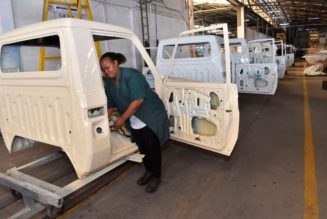Boss Talk
Parmain ole Narikae: KIE boss turnaround plan sees State firm turn a profit
Friday January 05 2024

Parmain ole Narikae, the managing director of Kenya Industrial Estates (KIE). ILLUSTRATION | JOSEPH BARASA | NMG
Parmain ole Narikae, the managing director of Kenya Industrial Estates (KIE), has led the State entity as it ended a streak of losses to assert its role in growing small businesses.
KIE in the financial year ended June 2020 posted a Sh3.9 million profit—the first in the history of the entity since its inception in 1967 — and has built on this to post profit growth for three years running, including Sh52.3 million in 2022.
Dr Narikae, a former corporate banker, spoke with the Business Daily on his journey from the private sector to public service, rallying the KIE team into turnaround and other milestones, including the entity’s annual funding to MSME crossing the Sh1 billion mark.
He also shares on the future of the entity in providing industrial parks, offering medium to long-term financing and giving business advisory and training services to small businesses in the manufacturing space.
How was the experience moving from the private sector to the public service?
The experience has been really exciting, different and at the same time enriching because in the public sector, you directly participate in interventions that directly impact the lives of people. And to do that with interventions that are developmental in nature is really enriching and rewarding.
KIE has turned from a loss-making entity to profitability, with the first profit in 53 years coming in 2020. What did it take to turn the corner?
We posted the profit in really difficult times when the country and the entire world was battling Covid-19 disruptions. And we have gone ahead to build on this.
It took tremendous support from the parent ministry [Ministry of Co-operatives and MSMEs Development], the board and all the staff. It required a pragmatic turnaround strategy and the commitment of all stakeholders, particularly the staff, to be able to bring out the organisation’s impact of transforming lives through small businesses.
How did your background in the financial sector shape your approach to your role at KIE?
Transforming KIE has not been a one-person affair but rather a team work. I am just part of a bigger team that is committed to deliver on the mandate of KIE and impact on SMEs and the lives of Kenyans.
But definitely the experience from the private financial sector helped because KIE has some aspects of a development financial institution, managing a business and working with and through people. This came in handy.
Many public sector entities are grappling with ambition, transparency and efficiency. What did it take for KIE to be ranked among the best performing entities [seven out of 394 in the latest government performance contracting] in State corporations, Ministries, Departments and Agencies?
It has been an interesting and transformative journey along the way because our focus is to support micro-small and medium sized enterprises in manufacturing and we do it through incubation and acceleration, access to finance and entrepreneurial capacity development.
We have to emphasise on a clear vision that for us to succeed, it is about impact on MSMEs not just urban or peri-urban areas but also rural areas. It has been a team effort.
We have been able to focus exclusively on our mandate and rallied our vibrant, committed and passionate team behind the vision. This has taken focus on our mandate through clear strategy by the board and implementation by management, through crucial support by the parent ministry and government.
Budget constraints are cited as a drawback for many State entities in achieving their mandate. What has been the experience of KIE and how has it succeeded in delivering on its goals in such an environment?
Budget constraints are a challenge not just for KIE but across entities because the government has to balance the competing requests for resources.
We always strive to work within the available resources and this has meant being innovative and to be able to do more with less through a razor-sharp focus on specific areas of our mandate that carry the highest impact.
There is demand for resources, particularly for lending but empowering manufacturing businesses to grow from micro to medium and eventually to corporates takes more than just money. It is about using all our experiences to make progress.
Many SMEs grapple with trust deficit in the eyes of financiers, especially commercial banks, because of low survival rates and high defaults on loans. How has KIE helped in addressing this?
What we have proposed to do is that we prepare our SMEs even for lending because we carry our entrepreneurial training and also ensure they have got sound business plans.
Advancing credit is not enough. Even when they tap our credit, we still continue to give them capacity building to develop the necessary skills to be able to expand. This is continuous so that at any given time, we are there to support.
Entrepreneurs may not have all the required skills at the beginning but they may have very good ideas. So, we come in to help develop financial literacy skills including accessing markets for their goods and managing people. When there are challenges such as the Covid-19 shock, we are there to support.
Some of the enterprises that KIE incubated such as the Haco Industries, Spectre International, Nice & Lovely, Ramboo Furniture and Mastermind Tobacco have grown into large or international companies. And many more can rise through the ranks.
What has stood out for you in your role at KIE?
What has stood out for me is the immense potential and the role of KIE in powering the dreams of MSMEs in the manufacturing sector. Seeing those SMEs succeed in industrialisation and create wealth and jobs has been very rewarding.
Nurturing businesses to graduate from micro entities to small, medium and eventually large enterprises or corporates is quite a journey.
It requires a lot of deliberate focus to believe in the entrepreneurs behind such entities and to support their dreams.
Money is just a part of the story but the person to be celebrated is that entrepreneur who does not quit, believes in his dream, fails and wakes up again and is willing to be supported. These are people whose resilience has really built my belief that it is possible to incubate and accelerate small businesses to big enterprises.








![Weekly Report [June 07 – 14]: 3iQ Crypto Feeder ETFs, Lithuania booming crypto wallet ban, MasterCard NFT collaborations and more](https://www.wazupnaija.com/wp-content/uploads/2022/06/weekly-report-june-07-14-3iq-crypto-feeder-etfs-lithuania-booming-crypto-wallet-ban-mastercard-nft-collaborations-and-more-327x219.png)
